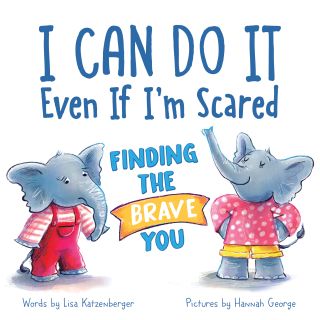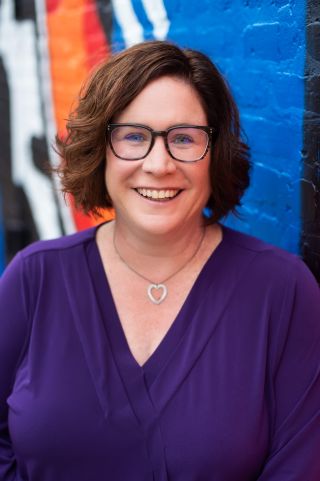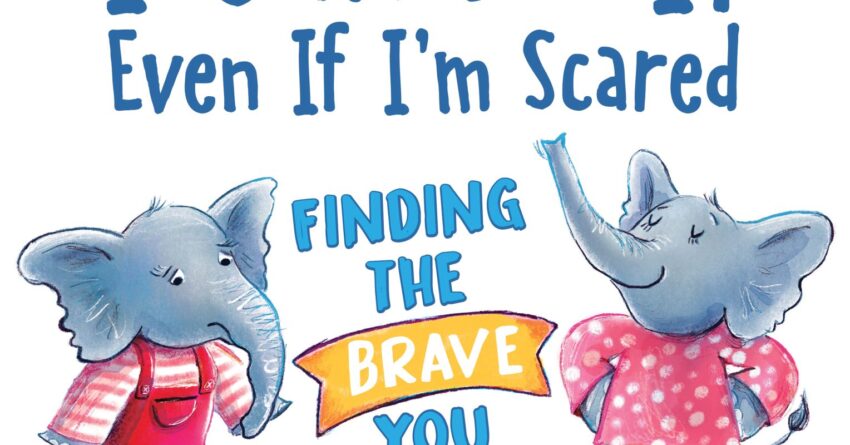Lisa Katzenberger’s latest picture book, I Can Do It Even If I’m Scared, offers children a valuable example of the popular cognitive behavioral therapy (CBT) technique, “Act As If.” When Elephant, Cheetah, and Gator are worried about trying out for soccer, singing in front of a group, and being alone in the dark, they imagine themselves as brave – and then, they become it.

Source: Sourcebooks/Used with permission
In therapy, the “Act As If” intervention commonly used in CBT encourages clients to adopt the mindset and behaviors of the person they want to become, even if in the midst of self-doubt. The more they think and act in a manner that aligns with their goals, rather than their insecurities, anxieties, or maladaptive tendencies, the more likely they will be to receive positive feedback from their environment, boost their confidence, and ultimately make lasting change in their way of approaching life.
CBT has proven to be effective in treating many mental health concerns, including anxiety, depression, bulimia nervosa, and many more (Nakao M, Shirotsuki K, Sugaya N., 2021). In fact, play-based CBT has emerged as an effective intervention for young children, bringing well-researched CBT principles into the child’s world of play (Knell SM., 1998). Katzenberger’s characters show children how to harness their imagination to visualize themselves brave.
Inspired by her own journey through therapy, Katzenberger shared the story behind her book.
Q: What do you love most about writing stories for children?
What I love is that authors can expose children to so many new and different experiences beyond the readers’ current world. Stories can also help children learn that there are other kids who think and feel the same things they do and help them feel less alone.
Q: What initially drew you to seek the support of a therapist?
I first started therapy in my twenties when I was experiencing depression. On the outside, I had what appeared to be a good life – a career, a relationship, friends, great family. But I was never happy with myself. It took guts for me to make a call and seek help, but I am so glad I did.
I have seen therapists on an off for the past twenty years (currently on). I kept this part of my life very private for most of the time. I thought people would judge me (and some did) and think less of me that I couldn’t just handle things or grin and bear it. But now I realize how much strength it took to work on my mental health and I am proud that I am focusing on my own self-care.
Q: What was your experience of therapy like?
Talking to a therapist about anything and everything on my mind is extremely freeing. I love having someone who will listen to whatever I want to talk about, who can help me find my way through problems, and encourage me that I am stronger than I realize and I will be OK.
I’ve also done exercises like picturing my anxiety (it looks purple and squishy) and naming my anxiety (Janice) so I could envision it as a tangible thing that I could address and control. I learned a lot about self-talk to work through moments of self-doubt or fear, and worked on understanding my black and white thinking.
Q: In the Author’s Note in your book, you describe experiencing anxiety before delivering a presentation or teaching a class. How long have you struggled with anxiety?
My depression has been with me a long time, but it wasn’t until I had my own children thirteen years ago that I was also diagnosed with anxiety. I became very nervous about a lot of things—chasing two toddlers around a playground, I constantly worried there could be an accident at every turn.
Cognitive Behavioral Therapy Essential Reads
I also began to experience social anxiety and would often cancel plans at the last minute because the stress of how I would come across or what people would think of me was too much to handle. Avoidance became my coping mechanism. Then that worry started to interfere with my work, but I was not able to cancel a class 30 minutes before it started (although there were times I seriously considered it). I knew I had to learn how to handle my worries and fears.
Now, with a balance of therapy, medication, exercise, and honesty, I am feeling much more pulled together. I still have anxious moments here and there, but I know they are temporary and that I can work through them.
Q: Your newest book is based on the CBT technique “Act As If.” How did you know this was an idea that would resonate with children?
I often write about my own experiences, and as I was struggling with anxiety, I saw in my own children how brave they would be when they played – whether climbing up a slide, playing pretend, or riding a tricycle. They were fearless. I wanted to be as brave as they were.
As I learned about the “Act As If” technique in therapy, I quickly connected it to children playing pretend. It seems like such a natural technique that kids already knew all about! So I built a story around the concept, detailing the steps I took to become The Brave Lisa. I was eager to share what I learned as an adult and wished I had known when I was much younger.
Q: What do you hope children will take away from reading your book?
My hope is that children will read this and learn that there are techniques they can use to manage emotions. Emotions can be big and overwhelming. But I’ve learned that there are specific actions and behaviors people can use to work through them. I hope this book can serve as a first step in learning to talk about mental health and help children find the bravest version of themselves.

Author Lisa Katzenberger shares a valuable CBT tool with young children in her latest picture book.
Source: Sourcebooks/Used with permission
Q: From your point of view, how does reading help children, and adults, when it comes to mental health?
I think one of the biggest things reading can do is help kids see themselves in books. If they see someone talking about their emotions, like Giraffe in my previous book, It Will Be OK, maybe it will give them courage to talk about their emotions too. Same goes for adults. Today’s generation is much more in touch with their mental health than when I was growing up. Books play a great role in that because children can see so many different possibilities that might be broader than what they are currently able to envision.
Reading really opens up the world for children and can provide hope that they can be their true selves and will find their place in the world.
